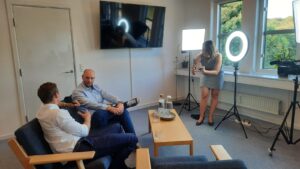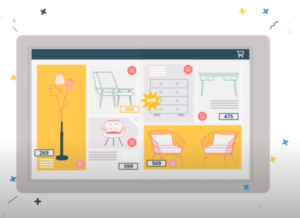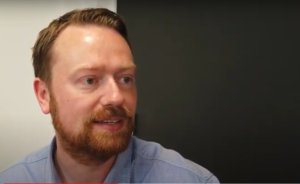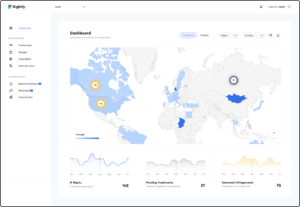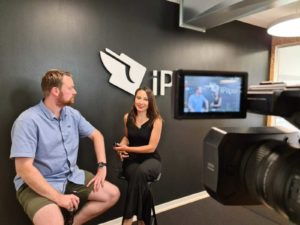The Digital Transformation Show [E1P2]: The Influence Of Danish Play & Learn Culture In uQualio Platform
As the conversation with Kent Valentin Fallesen progressed, the CEO at the video e-learning platform uQualio disclosed how his personal experienced has influenced his company’s journey, why they are interested in on-boarding more software enterprises on their platform and what he believes are the best e-learning practices – including the micro-learning trend.
The most impressive findings for me were the fact that uQualio is the first organic result on the search “video e-learning platform” thanks to their hard SEO work – AMAZING! – and how the Danish culture of playing and learning has influenced the company.
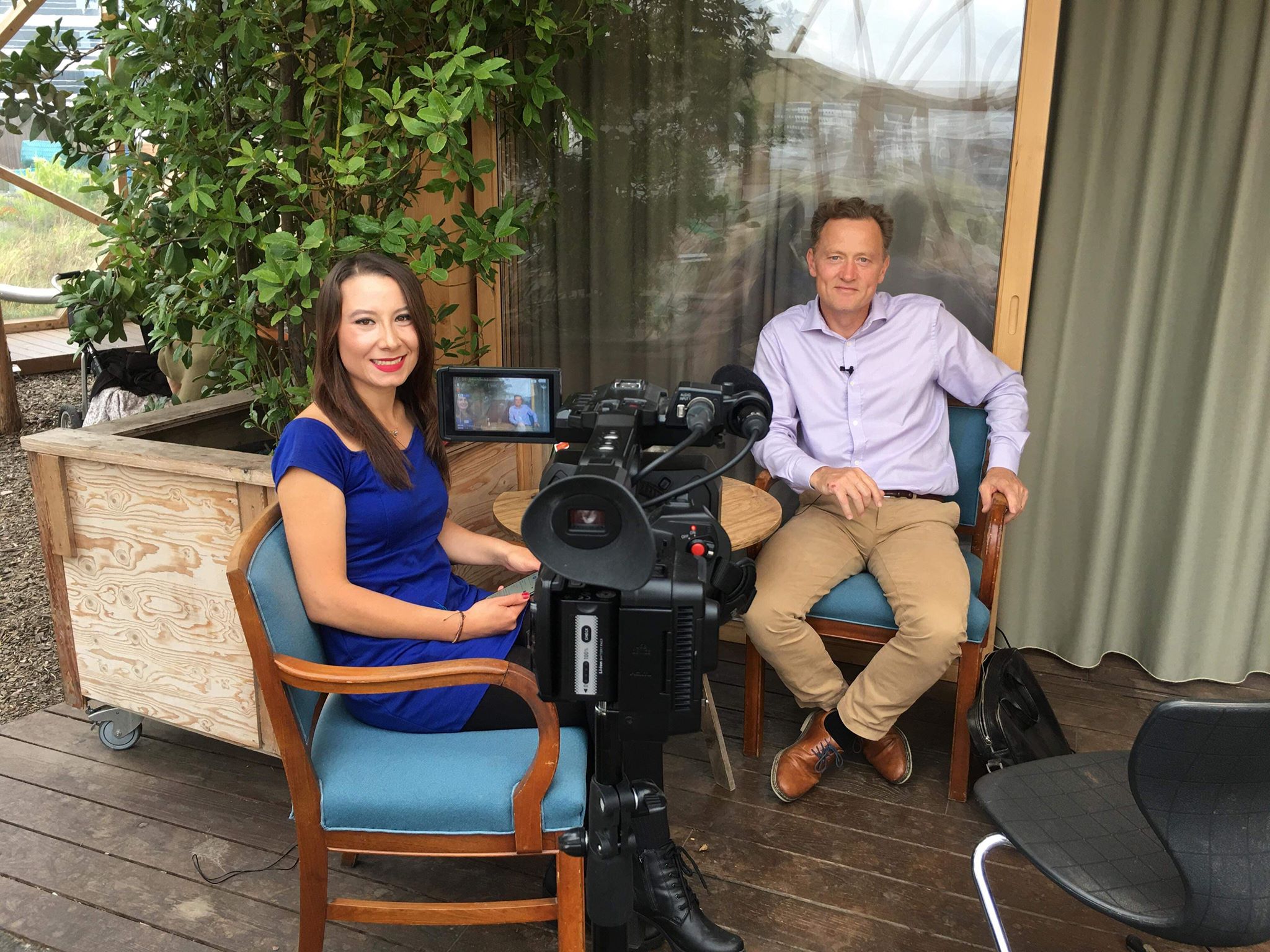
As the conversation with Kent Valentin Fallesen progressed, the CEO at the video e-learning platform uQualio disclosed how his personal experienced has influenced his company’s journey, why they are interested in onboarding more software enterprises on their platform and what he believes are the best e-learning practices – including the micro-learning trend.
The most impressive findings for me were the fact that uQualio is the first organic result on the search “video e-learning platform” thanks to their hard SEO work – AMAZING! – and how the Danish culture of playing and learning has influenced the company.
Find the video and the full transcription of the interview below.
Watch the first part of the episode here: The Digital Transformation Show [E1]: Video Microlearning, UX, Gamification And More About uQualio Platform
Estefanía Zárate Angarita: Which other industries would you like to reach now? Are you looking forward to onboarding different type of companies as customers right now?
Kent Valentin Fallesen: I was just told before I came here that we got a new software company on board, and software companies are very interesting for us because basically, they need user training, they need to train their sales partners, their distributors or agents or resellers, and they need to train their own employees, so they have three of these user groups that we are looking at. So software companies are something that we would like to get and since we have the understanding as a software company as well, we speak their own language.
We see more and more that we are selling the product to retail, we see a big interest in them. We also see a lot of the companies that are selling their product within health care through partners, they are looking at us and they are willing to invest in what it takes to make the videos, so they are very relevant for us.
The hospitality sector, the service sector, the cleaning companies, the hotels… they all need to have a service organisation that is well trained so that when you enter a hotel, you are being met with a professional that actually knows something. If you go to a restaurant, you can meet someone who actually understands the concept and this is the way to do it, with our tool.
If you need someone to clean the coffee machines, how do they do that? Coffee is quite an important part of the revenue in any of these cafes around so, how do you clean the coffee machine? You need to have an instructional video about that. So we see that there’s a lot of different companies that we are approaching and that we are talking to.
E: There is something that really catches my attention and is that, of course, yourself and also your company are pretty much business-oriented, but being this an e-learning platform, why isn’t there some educational institution or more educational organisations interested in applying e-learning?
K: We just became a member of the EdTech Denmark that is newly created and actually the CEO of EdTech is coming to visit us on Monday at the office. I have to say that the sales process, typically if you sell to a very large corporation or you sell to governmental entities is typically a very, very long process, and it’s a very risky process as well so we prefer to work with smaller and medium-sized companies.
Of course, if large corporations would like to use our tool they are welcomed. We have two solutions, we have one that is kind of open and another one that is API-based. We offer NGOs a free version of our tool. Start-up companies can get a free version for two years, so we are also doing that, we are trying to give something back.
Non-profits like school as well can also use it but there is, of course, a limitation that children underaged cannot register as a user on our platform.
E: It’s very interesting to hear about your company but I’m pretty sure that there is a lot of your own personality and your own background behind what this company is doing right now, uQualio. So I would like to hear a bit more about you. You were just telling me that you’re from here, from Denmark, that you studied in Odense, what else can we hear about you?
K: Here in Denmark I don’t think we have military service anymore but we used to have, so when I was finished with high-school, I had to go to the military for one year. When I was done there, I had like ten months before I was going to University. I was looking for a job and I got a job as a school teacher, and I was a school teacher for six months and when I started University, I was asked by some of the colleagues whether I wanted to be part of working at a newly created school in Fyn. So I worked there for five and a half years, I had had a long experience with teaching. I had also been training grown-ups within negotiation but I have been working mainly with IT, I’ve been working internationally, I have a Master of Economics as a background and I’ve been working with learning, so all of that combined is been part of why uQualio was established.
E: You have a strong background of learning, teaching, training and also IT and business…
K: Exactly.
E: That is pretty much what uQualio is right now.
K: Yes, you can say that.
E: Okay, Kent. I guess that right now you’re also facing a lot of challenges since you’re growing as a company and you’re, not that new, but you’re still in the first stage of your company. What’s the next goal, what are your biggest challenges right now?
K: The biggest challenge is that we basically are born global which means that it doesn’t matter whether you are someone from Canada or from South Africa or Israel or Mexico or wherever you are from… you can actually get on the platform and start using it.
We provide a free trial that underlines how easy it is to use. We’ve had since January visitors from 190 countries on our website so we are getting out there. The idea is of course to get a certain kind of volume because, when you can start out with – not that I want to mention the price but it’s just to show how cheap it is – as a company you get started for 49 euros a month and then you can have up to 40 active learners and you can replace those during the month if you want to, so you can actually have as many as you want but up to 40 at the time. That means that the price is very low and that means that we have to base ourselves on volume.
So now we are doing a lot of initiatives, how can we create awareness that we actually exist? We know the product is great, we know the price is right but now we need to get out there. This is the main challenge we are working on right now because the software is great and we are doing something new. I don’t think is something someone does every day. We have to make search optimisation, basically, if you sit in France, which words do you use to search for someone like us, what would they search for and what combination of words would they search for… that is really, really difficult.
E: Is a lot of research…
K: Is a lot of research and it’s an expertise that is not something that you just have, you have to learn it.
E: I wanted to ask you of course, if you believe that e-learning is the future of learning, but I assume you do since you work on the field. The question would be then, why do you think that e-learning is the future of learning?
Because I know that there are many debates about e-learning and one of the main ones is that we have been having the same educational system, the same educational methodologies, globally even, during the last 200 years, 100 years, although the world has changed a lot and technologies have changed a lot… but our educational methods remain pretty much the same. So, why do you think it’s important and why do you think it’s the future of learning?
K: I think that unfortunately e-learning as a concept it’s been there a while… just because it’s an “e” in front, it shows that it’s been around for a while, like e-commerce. I think that e-learning is not just e-learning, I mean, you have to say that there is a difference between… Our concept is micro-learning, and that means that you are looking at what devices do you use nowadays. We are calling ourselves a video e-learning platform so video is important. A lot of people are still creating e-learning in a way that I don’t think it has to do with learning as such. There are some things that have to be there if you want to create learning, you have to make the user active, you have to create interactivity in it, you have to have gamification.
I think one of the things that have meant a lot for why e-learning is now becoming more relevant is because when they developed the smartphone and actually provided HD quality, then you can use applications on your smartphone and you can also watch videos on your smartphone and technology comes first and then behaviour comes after.
Maybe e-learning was too soon there but it’s different now than it was then. But people are still creating e-learning in old programmes that don’t work, that have been made for compliance reasons and not for learning. One should not look at e-learning as a concept but there is bad e-learning and good e-learning.
E: There is a reason why we have decided to create this program, The Digital Transformation Show, here in Denmark, and it’s because the Danish ecosystem allows companies to thrive in a digital environment. We have e-government, we have digital apps and platforms for almost anything you need to do here in Denmark. So just as a general question, what do you think makes Denmark so special for these companies like uQualio to succeed?
K: I think, first of all, we are lucky that we have a very high educational level. Also, for some reason, I don’t know why, but there is a long tradition for creating software; we have a lot of companies that were acquired and I think learning… if you take Lego, as a company, which means basically “God Leg”, “good way of playing”, we have this tradition also. I think we were one of the first countries in the world that actually made a law about children’s right to play. And play, and learn, that’s two important things, and it’s not just about sitting in the books, you have to think about, this has to be fun to learn. I wouldn’t say that is one thing, I think is a combination of many things… creativity has to thrive, children, they have to play, they have to have fun, otherwise, they are not motivated.
E: Kent, thank you very much for joining us today in this beautiful setting, the Dome of Visions in Aarhus. Is there anything else that you would like to tell our audience, how can they find your platform? How can they try it out? Where do they find you?
K: Oh, it’s quite easy! They can find us online, and as I mentioned actually we offer a free trial for 14 days, so Uqualio.com. If they write “video e-learning system” we will pop up, we don’t pay AdWords yet but we will be the first organic that they find. They are welcome to book a meeting with us, we provide a course for free if they want to have a station where they can go through how can they use our tool, they can book an online meeting. We make reviews or the free trial to help them know what they get out of it, they have 14 days to try it out for free.
Visit www.uqualio.com
